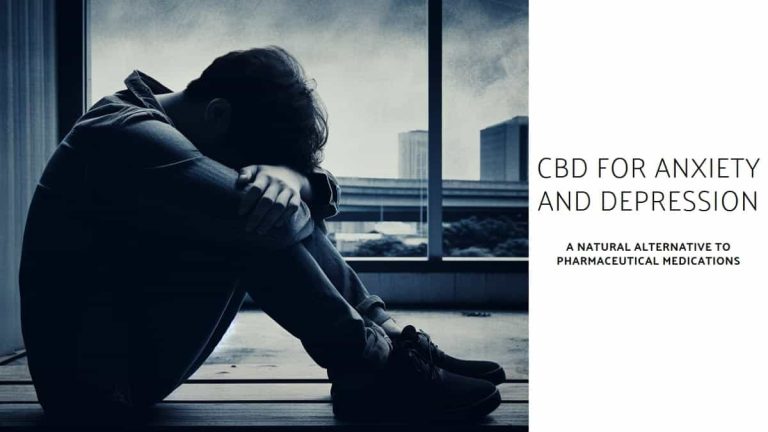Benefits of CBD for reducing anxiety: CBD or cannabidiol is a non-psychoactive compound found in the cannabis plant that is becoming increasingly popular for its various potential health benefits. One of the most promising benefits of CBD is its ability to reduce anxiety. In this article, we will discuss the surprising benefits of CBD for reducing anxiety and how it works.
Table of Contents
Understanding Anxiety
Anxiety is a natural response of the body to stress, danger or unfamiliar situations. It is normal to experience anxiety in certain situations such as before a job interview, a public speaking event or an important exam. However, when anxiety becomes excessive and uncontrollable, it can lead to a disorder that affects the daily life of a person. Anxiety disorders are the most common mental health condition in the United States, affecting over 40 million adults.
Anxiety can manifest in different forms such as generalized anxiety disorder (GAD), social anxiety disorder, panic disorder, and post-traumatic stress disorder (PTSD). The symptoms of anxiety can include restlessness, irritability, excessive worry, difficulty concentrating, insomnia, and physical symptoms such as sweating, palpitations, and shortness of breath.
Traditional Treatments for Anxiety
The most common treatments for anxiety disorders are psychotherapy and medications such as benzodiazepines and selective serotonin reuptake inhibitors (SSRIs). Psychotherapy involves talking to a mental health professional to address the underlying causes of anxiety and to learn coping strategies. Medications are used to manage the symptoms of anxiety, but they often come with side effects such as drowsiness, nausea, and addiction.
The Surprising Benefits of CBD for Reducing Anxiety
CBD has been shown to have potential as a natural alternative to traditional treatments for anxiety. In fact, a 2015 review of studies concluded that CBD has a great potential as a treatment for anxiety disorders. CBD works by interacting with the endocannabinoid system (ECS) in the body, which is responsible for regulating various physiological and cognitive processes such as mood, sleep, and pain perception.
CBD has been shown to have anxiolytic (anti-anxiety) effects by regulating the levels of neurotransmitters such as serotonin and GABA in the brain. Serotonin is a neurotransmitter that is responsible for regulating mood, sleep, and appetite, while GABA is a neurotransmitter that is responsible for calming the nervous system. Low levels of serotonin and GABA have been linked to anxiety and depression.
In addition to regulating neurotransmitter levels, CBD has also been shown to have anti-inflammatory and antioxidant effects. Chronic inflammation and oxidative stress have been linked to the development of anxiety and other mental health conditions.
CBD also has a better side effect profile compared to traditional medications for anxiety. While benzodiazepines and SSRIs often cause side effects such as drowsiness and nausea, CBD is generally well-tolerated and has minimal side effects. Some of the reported side effects of CBD include dry mouth, low blood pressure, and drowsiness, but these are usually mild and temporary.
How to Use CBD for Anxiety
CBD is available in various forms such as CBD oils, CBD tinctures, CBD capsules, and CBD edibles. When using CBD for anxiety, it is important to choose a high-quality product from a reputable manufacturer. The recommended dosage of CBD for anxiety varies depending on the severity of the symptoms and the individual’s tolerance.
It is also important to consult with a healthcare professional before using CBD, especially if you are taking other medications. CBD can interact with some medications such as blood thinners and antipsychotics.

CBD for Reducing Anxiety: Conclusion
CBD has shown great potential as a natural alternative to traditional treatments for anxiety disorders. CBD works by regulating the levels of neurotransmitters in the brain and has anti-inflammatory and antioxidant effects. CBD also has a better side effect profile compared to traditional medications for anxiety, making it a promising option for those seeking a natural and safer alternative.
While more research is needed to fully understand the effects of CBD on anxiety, the existing studies are promising and show great potential. CBD can help reduce anxiety symptoms, improve mood and promote overall well-being.
If you are considering using CBD for anxiety, it is important to consult with a healthcare professional to determine the appropriate dosage and to ensure that it is safe to use with any other medications you may be taking. It is also important to choose a high-quality product from a reputable manufacturer to ensure its efficacy and safety.
In addition to using CBD, there are other lifestyle changes that can also help manage anxiety, such as regular exercise, getting enough sleep, eating a healthy diet, and practicing relaxation techniques such as meditation and yoga. By making these changes and incorporating CBD into your daily routine, you may be able to manage your anxiety more effectively and improve your overall quality of life.
In conclusion, CBD has many surprising benefits for reducing anxiety and promoting overall well-being. Its natural properties and low risk of side effects make it an attractive option for those seeking a safer and more natural approach to managing their anxiety. With the right guidance and high-quality products, CBD can be an effective tool for those looking to improve their mental health and overall wellness.




[…] oil is a natural oil extracted from the hemp plant. It contains cannabidiol (CBD), which is a non-psychoactive compound that interacts with the body’s endocannabinoid system. […]
[…] If you are struggling with sleep issues, CBD may be able to help. Research suggests that CBD can reduce anxiety, pain, and inflammation, all of which can interfere with sleep. It may also increase the amount of […]
[…] CBD and smoking can offer a range of benefits, from reducing anxiety to promoting relaxation and pain relief. However, it’s important to be mindful of the […]